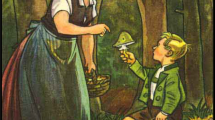Abstract
A satisfactory and accepted solution to Riddle 4 in the vernacular collection of riddles in the Exeter Book has not yet been made and Riddle 4 remains one of the most puzzling riddles in the collection. However, detailed analysis of the semantic range of the language in Riddle 4 reveals that its language is found primarily in the particular religious contexts of the penitentials and homilies. These contexts direct the Riddle’s audience to a specific reading, and thus solution, of its clues. It is argued in this paper that the Riddle’s solution is a devil and that consequently the purpose of the Riddle is to remind Christians of the pervasive threat of the devil and of the need for continual vigilance against devilish temptation.
Similar content being viewed by others
References
Barley Nigel F. (1974) Structural Aspects of the Anglo-Saxon Riddle. Semiotica 10: 143–176
Barney Stephen A. (1977) Word-Hoard: An Introduction to Old English Vocabulary. Yale University Press, New Haven & London
Bessinger Jess B. (Ed). (1978) A Concordance to the Anglo-Saxon Poetic Records. Cornell University Press, Ithaca
Bethurum Dorothy (Ed). (1957) The Homilies of Wulfstan. Clarendon, Oxford
Bosworth, Joseph T. and Toller, T. Northcote. An Anglo-Saxon Dictionary. Oxford: Oxford University Press, 1882–1898. With supplement by Toller, T. N. An Anglo-Saxon Dictionary...Supplement. Oxford: Oxford University Press, 1908–1921. Addenda by Campbell, Alistair. An Anglo-Saxon Dictionary...Enlarged Addenda and Corrigenda. Oxford: Oxford University Press, 1972
Cameron Angus, et al. (Ed.), (1986) Dictionary of Old English. Pontifical Institute of Mediaeval Studies, Toronto
Cameron Angus, et al. (Ed.), (1983) Old English Word Studies: A Preliminary Author and Word Index. University of Toronto Press, Toronto
Clark Hall, and John R. A Concise Anglo-Saxon Dictionary. 4th edn. with supplement by H. D. Meritt. Cambridge: Cambridge University Press, 1960. Repr. by University of Toronto Press, Medieval Academy Reprints for Teaching 14, 2000
Crossley-Holland Kevin (1993) The Exeter Book Riddles. Rev. edn. Penguin, Harmondsworth
Doane A. N. (1987) Three Old English Implement Riddles: Reconsiderations of Numbers 4, 49, and 73. Modern Philology 84: 243–57
Ehrhart Margaret J. (1975) Tempter as Teacher: Some Observations on the Vocabulary of the Old English Genesis B. Neophilologus 59: 435–446
Fowler Roger. (1965) A Late Old English Handbook for the Use of a Confessor. Anglia 83: 1–34
Frank, Roberta. “Poetic Words in Late Old English Prose,” in From Anglo-Saxon to Early Middle English: Studies Presented to E. G. Stanley. Eds. Malcolm Godden et al. Oxford: Clarendon Press, 1994, pp. 87–107
Frank, Roberta, “Mere and Sund: Two Sea-Changes in Beowulf,” in Modes of Interpretaion: Essays in Honor of Stanley B. Greenfield. Eds. Phyllis Rugg Brown et al. Toronto: University of Toronto Press, 1986, pp. 153–172.
Fry Donald K. (1981) Exeter Book Riddle Solutions. Old English Newsletter 15: 22–33
Hall J. R. (1975) Geongordom and Hyldo in Genesis B: Serving the Lord for the Lord’s Favor. Papers on Language and Literature 11: 302–7
Hamnett Ian. (1967) Ambiguity, Classification and Change: The Function of Riddles. Man 2: 379–92
Krapp, G. P. and Dobbie, E. K. Eds. The Anglo-Saxon Poetic Records. 6 vols. New York: Columbia University Press, 1931–1942
Lee Alvin A. (1972) The Guest-Hall of Eden: Four Essays on the Design of Old English Poetry. Yale University Press, New Haven
Lerer Seth. (1991) Literacy and Power in Anglo-Saxon England. University of Nebraska Press, Lincoln
Loyn H. R. (1955) Gesiths and Thegns in Anglo-Saxon England from the Seventh to the Tenth Century. English Historical Review 70: 529–549
Mitchell Bruce. (1975) Linguistic Facts and the Interpretation of Old English Poetry. Anglo-Saxon England 4: 11–28
Mitchell Bruce, Robinson Fred C. (Eds.), (1998) Beowulf: An Edition with Shorter Relevant Texts. Blackwell, Oxford
Muir Bernard J. (Ed.), (2000) The Exeter Anthology of Old English Poetry. 2 vols, 2nd rev. edn. University of Exeter Press, Exeter
Napier Arthur S. (Ed.), (1883) Wulfstan: Sammlung der ihm zugeschriebenen Homilien, nebst Untersuchungen über ihre Echtheit. Weidmannsche, Berlin
Ohlgren Thomas H. (Ed.) (1992) Anglo-Saxon Textual Illustrations: Photographs of Sixteen Manuscripts with Descriptions and Index. Medieval Institute Publications, Kalamazoo
Porter John (1995) Anglo-Saxon Riddles. Anglo-Saxon Books, Frithgarth
Roberts Jane, et al. (Eds.) (1995) Thesaurus of Old English 2 vols. King’s College London Medieval Studies, London
Salmon Vivian (1959) Some Connotations of ‚Cold’ in Old and Middle English. Modern Language Notes 74: 314–322
Skeat, Walter W. Ed. Ælfric’s Lives of the Saints. EETS os 76, 82, 94 and 114. London: Oxford University Press, 1881–1900. Rpt. in 2 vols. London: Oxford University. Press, 1966
Smith D. K. (2000) Humour in hiding: Laughter between the sheets in the Exeter Books Riddles. In: Jonathon Wilcox (Ed) Humour in Anglo-Saxon Literature. Brewer, Woodbridge, pp. 79–98
Stewart Ann Harleman (1981) The Solution to the Old English Riddle 4. Studies in Philology 78: 52–61
Temple Elżbieta (Ed.) (1976) Anglo-Saxon Manuscripts, 900–1066. A Survey of Manuscript Illuminated in the British Isles. Harvey Miller, London
Venezky Richard L., Healey Antonett ediPaolo (Eds.) (1980) A Microfiche Concordance to Old English, Publications of the Dictionary of Old English 1. Dictionary of Old English, Toronto
Williams, Edith Whitehurst. “What’s So New About the Sexual Revolution? Some Comments on Anglo-Saxon Attitudes toward Sexuality in Women Based on Four Exeter Book Riddles”. Texas Quarterly 18 (1975): 46–55. Rpt. in New Readings on Women in Old English Literature. Eds. Helen Damico and Alexandra Hennessey Olsen. Bloomington: Indiana University Press, 1990, pp. 137–145
Williamson Craig (1977) The Old English Riddles of the Exeter Book. University of North Carolina Press, Chapel Hill
Woolf Rosemary E. (1953) The Devil in Old English Poetry. Review of English Studies ns 4: 1–12
Author information
Authors and Affiliations
Corresponding author
Additional information
My thanks to Antonina Harbus for suggesting this title.
Rights and permissions
About this article
Cite this article
Heyworth, M. The Devils in the Detail: A New Solution to Exeter Book Riddle 4. Neophilologus 91, 175–196 (2007). https://doi.org/10.1007/s11061-006-9012-1
Published:
Issue Date:
DOI: https://doi.org/10.1007/s11061-006-9012-1




